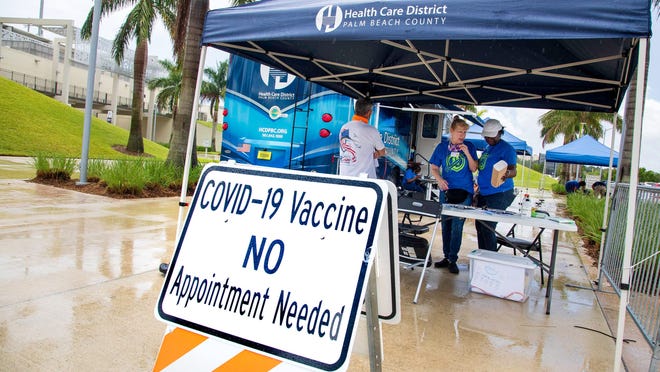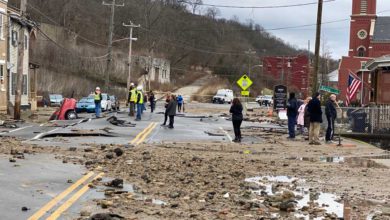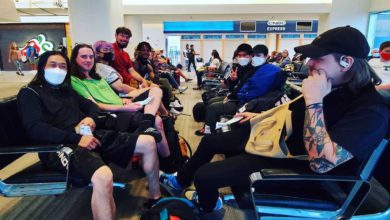
The nation's largest state will reopen Tuesday, effectively ending a slew of 15-month restrictions to stem the COVID-19 pandemic.
California is ranked 41st among the states where coronavirus was spreading the fastest on a per-person basis, according to a USA TODAY Network analysis of Johns Hopkins University data. With 11.87% of the country's population, California had 6.19% of the country's cases in the last week.
The Golden State is in a markedly different place than it was in December when it was declared by many to be the epicenter of the pandemic. California broke records for hospitalizations and single-day case numbers multiple days in a row. Deaths topped 30,000, then 45,000 the next month, and many funeral homes in Southern California were overrun by the surge.
Last week, California recorded 792 to 1,136 new infections every day, down from a December peak of nearly 54,000. In Los Angeles County, which in January lifted air quality restrictions so crematoriums could burn bodies, the number of cases reported Monday was 135.
"It's a new day," Gov. Gavin Newsom said during a news conference Monday, before the state's reopening. "This state is not poised to recover, it's poised, as was noted, to come roaring back."
That's partly due to vaccination numbers in the state. California has given 40 million vaccines, inoculating 72% of adults with at least one dose.
But COVID-19 is still a threat, however much success the state — and the rest of the country — may have had. The state isn't close to herd immunity, with demand dropping even with incentives.
Speaking Monday to reporters after the NATO summit in Brussels, President Joe Biden opened his remarks referencing the fact that while average coronavirus cases and deaths are “dropping dramatically” in the U.S., “there’s still too many lives being lost,” which he called “a real tragedy.”
"We have more work to do to beat this virus, and now is not the time to let our guard down," Biden said.
Also in the news:
►The University of California will require students, staff and faculty to be fully vaccinated against COVID-19 this fall, the latest in a myriad of colleges to require a vaccine to go on campus.
►The U.S. will send Mexico an overnight shipment of 1.35 million COVID vaccines after Vice President Kamala Harris promised a surplus shipment to the southern neighbor last week.
►A new study found that about one-third of Americans who are planning to retire now say COVID has delayed their retirement.
►Hawaii says a vaccinated Oahu resident who traveled to Nevada last month has tested positive for the delta variant of COVID-19. Hawaii Health Director Dr. Libby Char says this is a “very rare breakthrough” case in which a COVID-19 vaccine didn’t prevent infection.
►Vermont Gov. Phil Scott announced Monday that the state had surpassed 80% and that he was lifting all remaining COVID-19 restrictions in the state.
►British Prime Minister Boris Johnson has confirmed that the next planned relaxation of coronavirus restrictions in England will be delayed by four weeks until July 19 as a result of the spread of the delta variant.
►Two Iowa nurses were fired Monday after giving up to six times the proper dose of the COVID-19 vaccine to dozens of inmates at the Fort Madison prison in April, a maximum-security prison for men.
►More than 50 million people have experienced food insecurity during the pandemic, up from 35 million in 2019, according to the Feeding America nonprofit, the nation’s largest domestic hunger-relief organization.
►A COVID-19 vaccine made by Novavax of Gaithersburg, Maryland, is more than 90% effective in preventing infections and completely protected trial participants against severe disease, a company study shows.
? Today's numbers: The U.S. has more than 33.47 million confirmed coronavirus cases and at least 599,900 deaths, according to Johns Hopkins University data. The global totals: Over 176.2 million cases and over 3.8 million deaths. More than 144.9 million Americans have been fully vaccinated – 43.7% of the population, according to the CDC.
? What we're reading: Effective COVID-19 vaccines were developed in under a year. But a half-century after the country declared war on cancer, and 40 years after the first reported case of HIV/AIDS, there remains no way to prevent either disease or many more. Read the full story.
Keep refreshing this page for the latest updates. Want more? Sign up for our Coronavirus Watch newsletter for updates to your inbox and join our Facebook group.
Cashier fatally shot after mask dispute at Georgia supermarket
One person was killed and three others were wounded Monday in a shootout at a Georgia supermarket after an argument over wearing face masks, authorities said.
The alleged gunman started arguing with a cashier at Big Bear Supermarket in Decatur, Georgia, over his face mask, Dekalb County Sheriff Melody Maddox said during a news conference Monday. The shooter was identified by the Georgia Bureau of Investigation as Victor Lee Tucker Jr., 30, of Palmetto, Georgia.
The agency said preliminary information indicates that Tucker then left the store without making a purchase. He returned shortly after, pulling out a handgun and shooting the cashier. She later died from her injuries, Maddox said.
A deputy, who was working as a security guard and has retired from active duty, attempted to intervene in the shooting, Maddox said. The deputy and Tucker exchanged gunfire, and both were wounded during the shootout. Both have been transported to local hospitals.
One other cashier was wounded at the store but was treated at the scene.
Worldwide cases drop for seven weeks in a row, WHO director says
The head of the World Health Organization said the number of new coronavirus cases reported have now dropped for the past seven weeks, the longest such period of decline since the pandemic began.
At a press briefing on Monday, WHO director-general Tedros Adhanom Ghebreyesus welcomed the drop, but said the vastly unequal access to coronavirus vaccines was threatening further progress.
“The virus is moving faster than the global (vaccine) distribution,” Tedros said. He called for political leaders to commit to immunizing at least 70% of the world’s population by the time of next year’s G7 meeting.
Contributing: The Associated Press.
Source link








